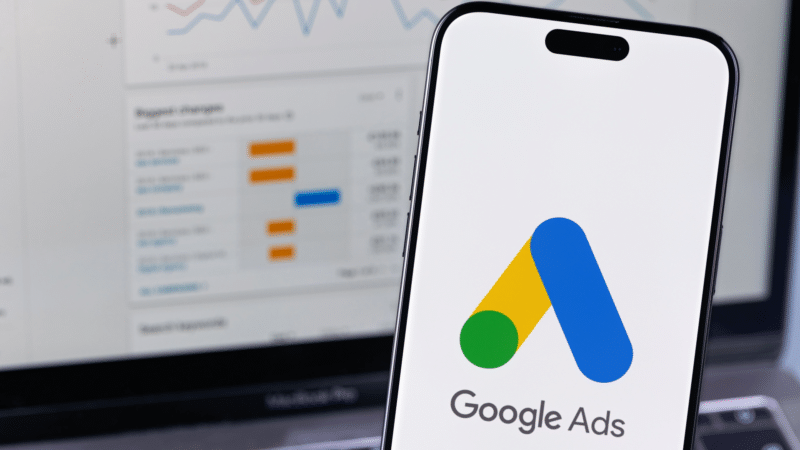
Understanding the interaction between Performance Max (PMax) and Search campaigns can be complex.
Determining whether PMax cannibalizes Search ads is particularly challenging, as Google Ads requires labor-intensive data downloads and spreadsheet analysis to uncover meaningful trends.
Our research at Adalysis (disclosure: I co-founded the company) addresses this challenge. With access to unique datasets through our PPC management platform, we have the technical expertise to analyze data at scale.
It uncovers:
- How often PMax search terms overlap with Search keywords.
- How often PMax search terms overlap with Search search terms.
- Wherever an overlap happens, which of the two campaign types has a higher impression, CTR, conversion rate or conversion value for the overlapping search terms.
Below, learn how Google prioritizes campaign types, the extent of search term overlap and insights to optimize your account’s performance.
The official priority order for Search vs. PMax
Google’s documentation references how search terms should trigger ads from Search and PMax campaigns. Understanding the intended priority order helps put our research into context.
Google sets out how PMax works with Search campaigns in its help file:
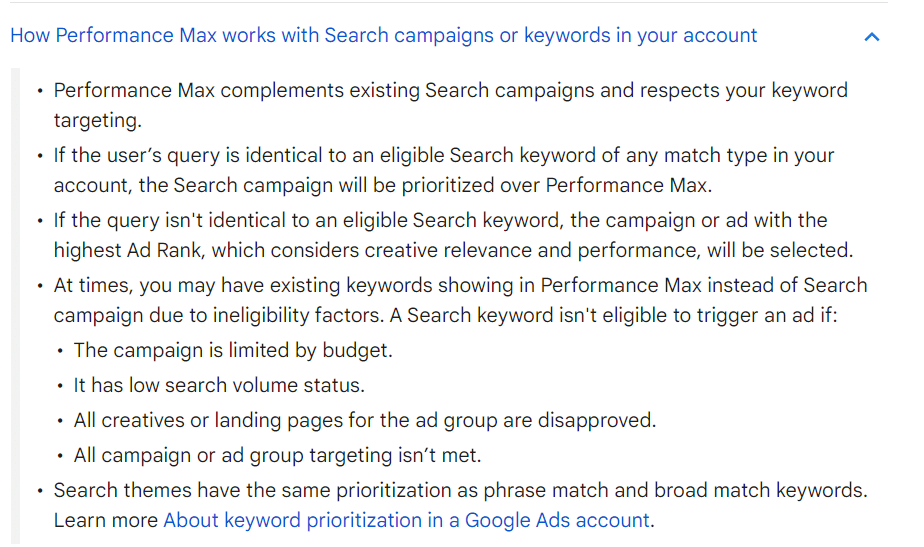
This is straightforward and implies that your search ad should show for all search terms identical to keywords of any match type.
For all other search terms, Google will use the campaign with the highest Ad Rank of any eligible keywords and PMax asset groups.
However, another help file that states:
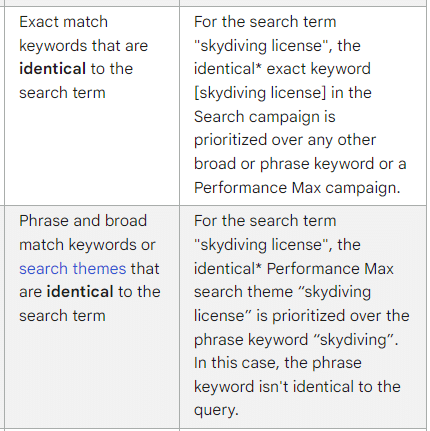
This implies:
- If your search theme is the same as an exact match keyword, the exact match keyword is prioritized.
- If your search theme is the same as a phrase or broad match keyword, Google can show an ad from your Search or PMax campaign.
(As a reminder, search themes in PMax campaigns can match any related search terms.)
This isn’t quite the same message. With this in mind, we decided to test what happens in real-world scenarios. Below are insights from our research.
Search term overlap
PMax ads appear for some Search keywords
We aimed to determine how often PMax ads were displayed for search terms that already existed as keywords (of any match type) in Search.
This only occurred 2.8% of the time across all PMax campaigns, with many accounts showing zero overlap. (These accounts often had a small PMax campaign and few Search keywords.)
A 2.8% overlap at the search term level is minimal. However, at the campaign level, 67% of PMax campaigns overlapped with search campaigns for one or more search terms.
There was also a wide range of overlap. Some PMax campaigns had zero overlap, while others reached 100%. For campaigns with 100% overlap, every PMax search term was also a Search keyword.
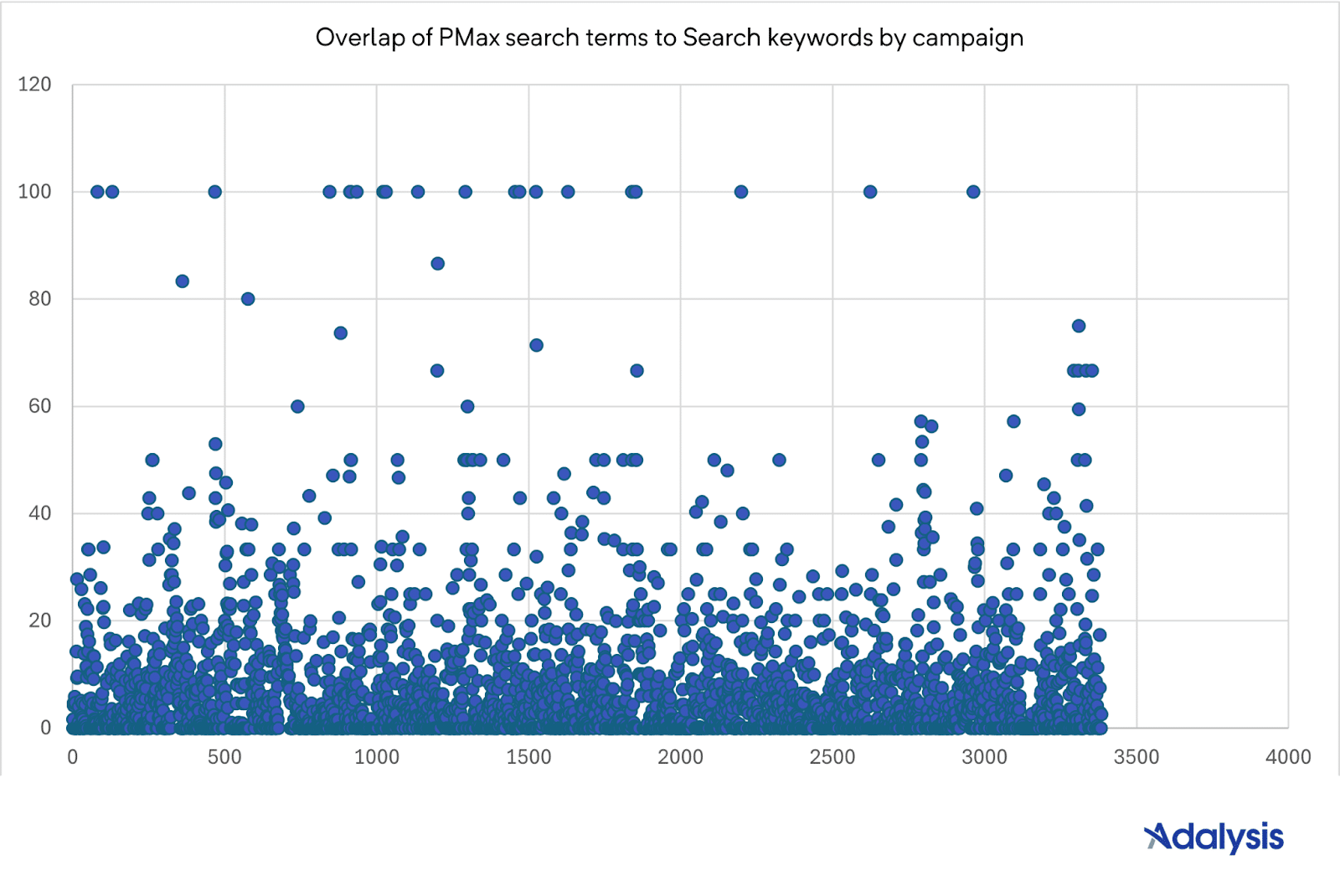
One interesting observation we made was that many PMax search terms contained misspellings and missing spaces (e.g., “papajohns” instead of “Papa Johns”).
Google has consistently stated that you don’t need to add misspellings as keywords, but this presents new implications for running concurrent PMax and Search campaigns.
If misspellings aren’t added as keywords, a misspelled search term won’t match your correctly spelled keywords. That might allow PMax ads to be shown instead of Search ads.
Google also no longer reports on misspellings for search terms in your Search campaigns.
As a result, it’s impossible to analyze the impact of misspellings on Search and PMax ad serving. This was confirmed in a LinkedIn update by Google’s Ads Product Liaison Ginny Marvin.
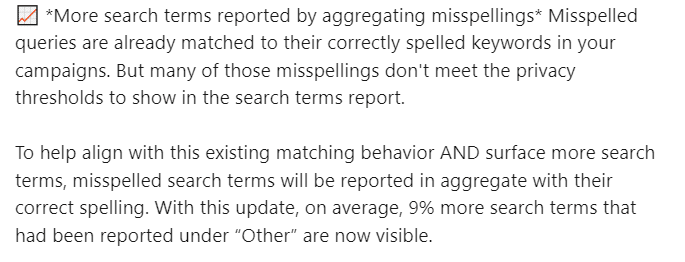
In summary:
- 67% of PMax campaigns have search terms that overlap with Search keywords. Make sure to review the overlap in your own accounts, which can range anywhere from zero to 100%.
Search terms in Search and PMax overlap significantly
Next, we explored how often search terms triggered both Search and PMax ads (i.e., the same search term exists in both a Search campaign and a PMax campaign).
We found this overlap rate to be 45%, indicating that almost half of PMax search terms can show ads from either Search or PMax campaigns.
It’s important to note that Search ad groups usually consist of tightly themed keywords and ads. The ad copy will likely be highly relevant to the search term.
In contrast, PMax involves creating ad assets to cover various search themes.
Consequently, most advertisers consider their PMax campaigns less relevant than their Search campaigns for the same search terms.
This discrepancy can result in dramatically different user experiences for the same search term.
Some users may see a PMax ad, while others may see a Search ad. Repeated searches can yield ads from different campaigns.
PMax outperforms Search for impression count
To better understand how Google prioritizes which campaign type to render the ad from, we looked at how the impressions of the same search term compare between the campaign types (for the same date range).
Our data shows that PMax ads had more impressions 43% of the time.

As previously noted, some accounts have no overlap issues – Search and PMax match separate search terms.
When we excluded those campaigns from our analysis, PMax achieved more impressions 61% of the time.

We’re excluding search terms with fewer than 10 impressions to prevent skewing the CTR and conversion rate data.
As a result, the overlap rates appear higher because we’re only including terms with at least 10 impressions.
This data, however, provides insight into how often overlaps occur for higher-volume search terms.
This raises an important question: what happens when a search term matches both a phrase or broad match keyword and a search theme?
In this case, Google calculates Ad Rank and prioritizes the targeting method with the highest Ad Rank.
Since PMax has more impressions than Search 61% of the time when there is overlap, it suggests that PMax may have a higher Ad Rank.
Expected CTR, a component of the Quality Score in the Ad Rank formula, plays a key role here.
While Google tracks Quality Scores at the search term level, we can infer that the campaign with the higher CTR may have a higher Quality Score.
This difference in CTR could explain why PMax generates more impressions than Search.
Performance comparison
Search outperforms PMax for CTR
For overlapping search terms, Search achieved higher CTRs 65% of the time.
This makes sense. PMax assets cover a broad range of search themes and terms, while Search ads are usually written for specific keywords.
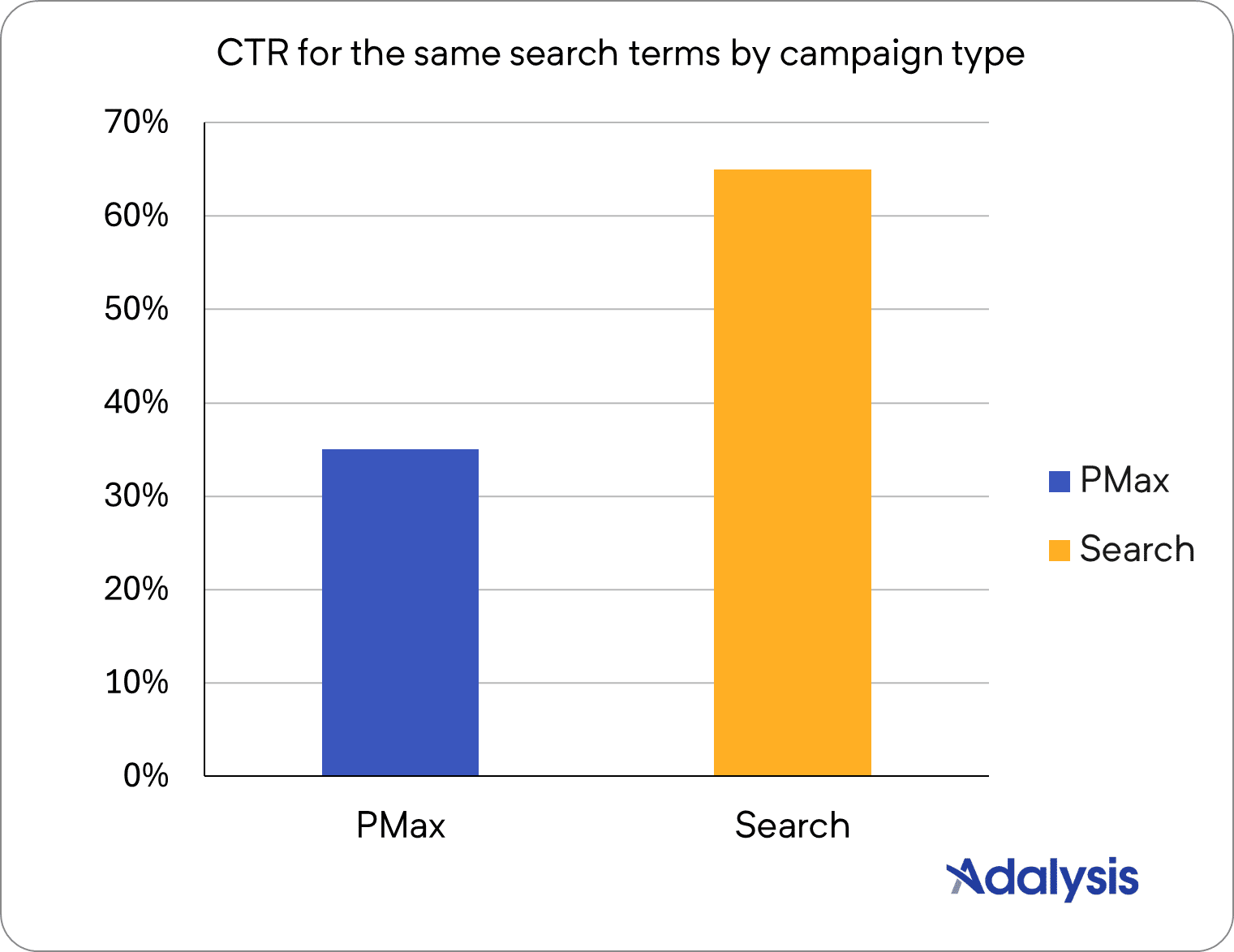
However, this finding doesn’t explain why PMax has more impressions.
Many advertisers apply conversion-based bid strategies.
If one campaign type has a higher conversion rate than another, a higher bid would be submitted to the auction for the higher conversion rate campaign type.
The bid is a large component of Ad Rank, which is one factor that determines which campaign type will appear for a search term.
We expect the higher conversion rate campaign to have more impressions for the same search terms than the lower conversion rate campaign.
While Google determines bids at the search term level, we’re looking for overall trends by comparing campaign conversion rates by campaign type to understand why PMax shows more often than Search campaigns for the same search terms.
Search outperforms PMax for conversion rates and values
Search campaigns had higher conversion rates for overlapping search terms 84.18% of the time.

Google does not publish cost data for PMax search terms, so we can’t calculate the difference in ROAS between Search and PMax campaigns.
However, since PMax gets more impressions than search, we would expect PMax to have higher conversion values.
In reality, Search had higher conversion values 84.62% of the time.

This means with fewer impressions, Search campaigns drive more revenue than PMax campaigns.
This data shows that PMax doesn’t have more impressions because it performs better.
If you’re running PMax campaigns for lead generation, you’ll want your top search terms to show Search ads.
This will likely lead to higher CTRs, conversion rates and conversion values.
How to control your search terms
Since Search usually outperforms PMax for the same search terms, optimizing the visibility of your Search campaigns can lead to higher conversion rates and return on investment (ROI).
Carefully manage your search terms and adding exact match keywords where relevant.
In Google Ads, you can access your PMax search term data by clicking on a campaign and then navigating to ‘insights and reports.’
Scroll down to the search terms insight section, click View detailed data, and download it.
Note: The download speed is significantly slower for PMax search terms than for Search campaign search terms. You will also need to repeat these steps for each PMax campaign.
Once you have your data, review your top PMax search terms to see if they are already Search keywords. If they aren’t, add them as exact match keywords.
Ensure every Search ad group uses relevant ad copy and landing pages, as this should increase CTRs and conversion rates for those terms.
Alternatively, you can view and manage this data using the PMax search terms feature in Adalysis.
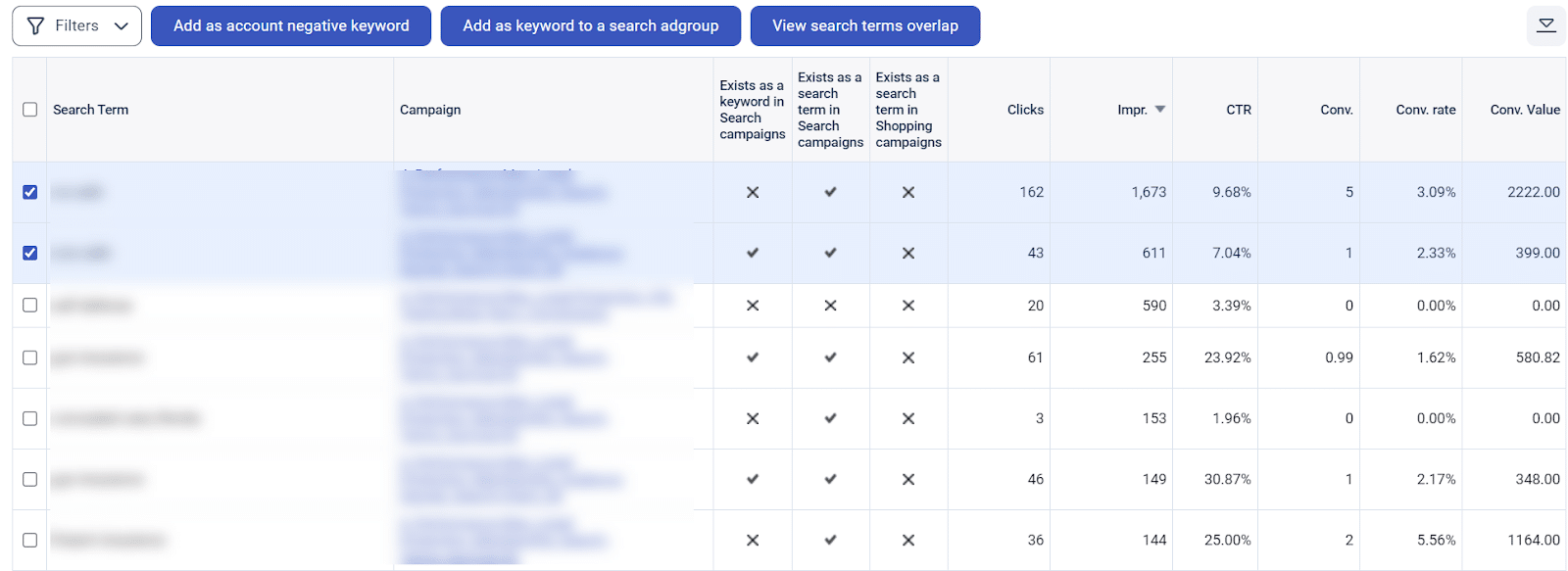
Redundant keywords reminder
You may see a Google Ads recommendation to “remove redundant keywords” when adding search terms as keywords.
Remember that if you accept that recommendation, you will not have the identical keyword in your search campaigns, which means PMax can trump search for those search terms.
This is one reason I recommend ignoring this suggestion.
Optimizing Google Ads: Insights on PMax and Search campaigns
To optimize your Search campaigns, monitor your search terms closely and add your top search terms as exact match keywords. This simple step will help you prioritize Search campaigns over PMax campaigns.
PMax can provide excellent value, especially for ecommerce.
For lead generation, PMax often functions as a cross-channel backfill, serving ads across the display network, apps and remarketing.
Another approach is to pause PMax and focus on expanding your Search and Display campaigns using the data you’ve gathered. Several large advertisers have adopted this strategy in recent months.
Regardless of your PMax strategy, ensuring that your search campaigns show over PMax for your top search terms will net you more clicks and conversions.
Note: The study focuses on non-retail Performance Max only, based on data from over 3,300 non-retail PMax campaigns containing around 1.2 million search terms. To avoid skewed results, we excluded PMax search terms with fewer than 10 impressions.
source https://searchengineland.com/performance-max-vs-search-campaigns-overlap-data-448788


0 Comments